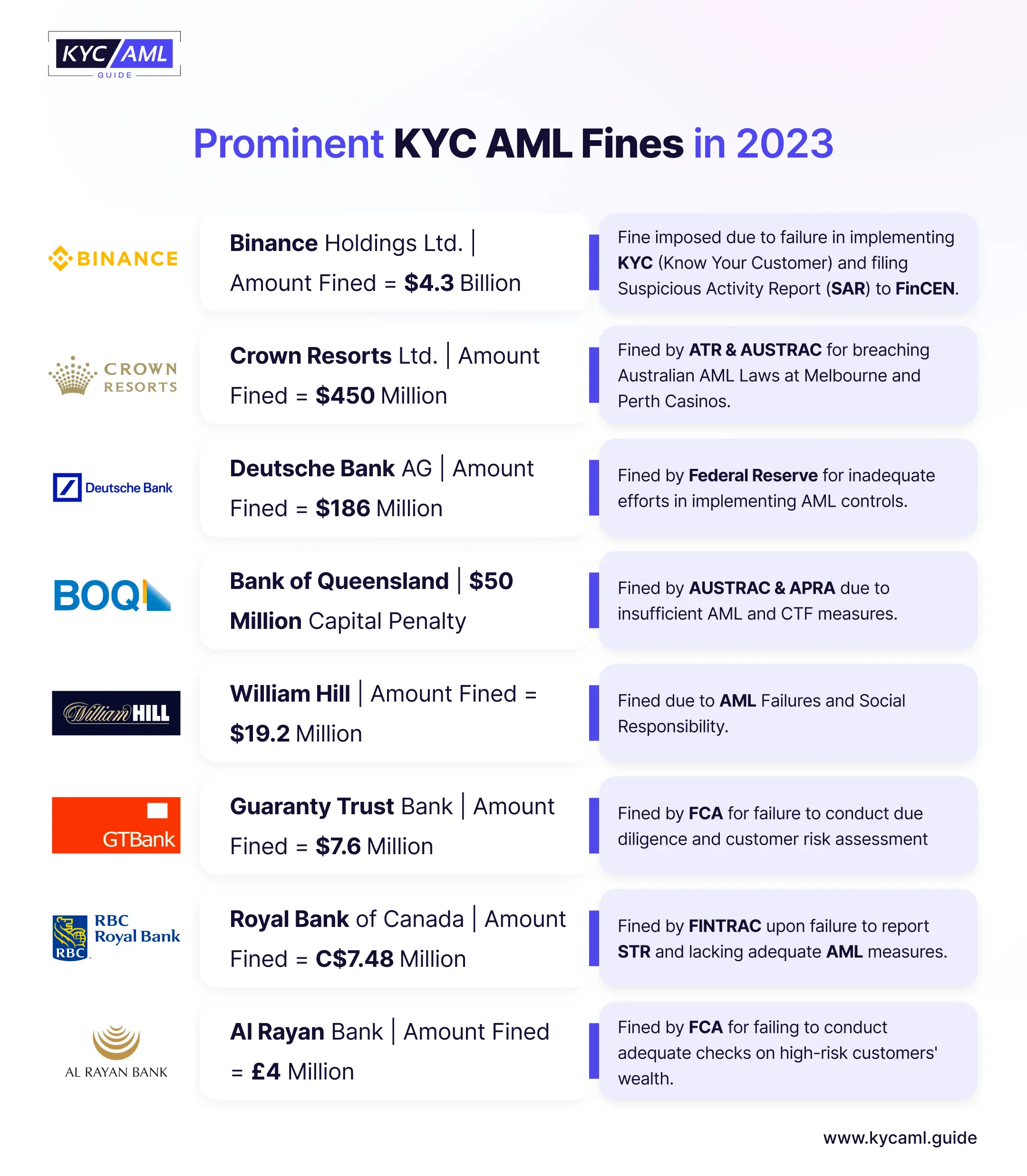The Importance of Staying Updated with KYC Regulations
Since KYC Regulations are ever-evolving, KYC Vendors, their fintech clients, and the end users (customers) require their specific level of understanding and upgraded knowledge on the latest happenings in KYC AML and CTF regulatory environment as per their jurisdiction. Here’s why staying ahead of the changing KYC Regulations is important for you:
| As a KYC Vendor |
|
| As a Fintech |
|
| As a User |
|
Overview of KYC Regulatory Fines in 2023

KYC AML Guide’s Regulatory Checklist: Your Guardian Against Loss to Non-Compliance
One of the best practices for KYC Solutions is to use an ideal checklist to ensure that no inadequacy or loophole is left unresolved in the deployed KYC Solution. To address this concern, the KYC AML Guide offers a comprehensive checklist to ensure that no critical area of the KYC process is overlooked, thereby enhancing the overall effectiveness of the deployed KYC solution and enabling your financial business to stay compliant with the most updated KYC Regulations.
Here’s an overview of the Ultimate Checklist for KYC Regulations:
Customer Identification Program
A KYC Solution should be able to automatically:
- Collect and verify customer identity information.
- Obtain government-issued identification (passport, driver’s license, etc.).
- Verify the accuracy of customer-provided information.
For this, the KYC Solution requires upgradation in its identity verification mechanisms. For example, the integration of Biometrics and selfie-based KYC can enhance CIP.
Customer Due Diligence (CDD) & Enhanced Due Diligence (EDD)
A KYC Solution needs to adhere to Customer Due Diligence and Enhanced Due Diligence by fulfilling the following requirements:
- Assess the nature of the customer’s business and risk profile.
- Identify the beneficial owner(s) and verify their identity.
- Understand the source of funds and wealth.
- Monitor and update customer information regularly.
- Conduct enhanced due diligence for high-risk customers.
- Obtain additional information for politically exposed persons (PEPs).
- Monitor transactions and account activity for unusual patterns.
This practice requires a risk-based approach by giving risk scores to different customer profiles based on their level of risk to the fintech.
Also Read: What is the end-to-end KYC process?
Data Security & Privacy
KYC Solutions needs to:
- Implement robust data protection measures.
- Comply with data privacy laws and ensure secure storage of customer information.
Ongoing Monitoring
KYC and AML Ongoing Monitoring are like the lifeline for upholding regulatory compliance in a fintech ecosystem. Here are the crucial aspects of KYC Ongoing Monitoring:
- Develop efficient tools and checks for real-time transaction monitoring.
- Implement alert systems for potential compliance issues pertinent to Monitoring.
This practice will ensure smooth and errorless customer onboarding of customer through an ongoing KYC activity.
Scalability and Integration
KYC Vendors need to ensure that their IDV solution is capable of growing efficiently with the customer growth and maintain its efficiency and effectiveness at the same time. It should:
- Ensure flexibility to adapt to the needs of identity verification of various industries.
- Ensure compatibility with various fintech platforms and other systems.
- Facilitate swift and easy integration with clients’ existing workflows.
Both scalability and integration will elevate the performance of existing KYC systems.
Transparent Pricing
Pricing strategy lies at the heart of influencing a client’s choice. The added factor of transparency in pricing a KYC Solution will increase the level of trust among the three parties i.e. a KYC Vendor, a business selecting the KYC Solution, and the end user (customer). Here are the main factors in pricing a KYC Solution that should be a part of KYC Regulatory Checklist:
- Clearly communicating pricing structures and terms to the fintech clients.
- Avoid hidden fees and ensure transparent billing practices.
In this way, customers will trust the KYC provided by the fintech for their onboarding. Also, the KYC Solutions as well as the fintech businesses can gain a competitive advantage over their competitors to retain their position in the market.
Final Thoughts
The Ultimate Checklist for KYC Regulations can act as a weapon of choice against illicit actors committing money laundering and fraud. It is a key to achieving excellence in regulatory compliance and fulfilling the necessary KYC and AML requirements to operate a fintech business. Moreover, secure and fast customer onboarding is a benchmark that KYC Vendors need to achieve alongside minimizing the number of False Accepts and False Rejects to enhance the identity verification process for seamless KYC.





